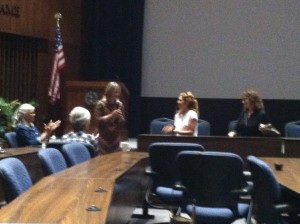She wasn’t a speaker at Attachment Parenting International‘s 2014 conference. She wasn’t even in the audience. But her name is stuck in my head.
As a bonus for early conference attendees, API hosted a showing of “The Milky Way” film on the evening before the weekend “Cherished Parents, Flourishing Children” conference at Notre Dame University at the end of September. As an added bonus, the lactation consultants behind the film, Chantal Molnar and Jennifer Davidson, were available for Q&A.
And during that Q&A, the name “Kate Frederick” became part of the conversation.
In the film, Kate’s part was just a brief glimpse of a 2013 newspaper article about a mother being fired from her job for breastfeeding. Her name wasn’t mentioned in the film, just a reference to the many mothers who have been discriminated against because of their choice to breastfeed.
But after several showings of “The Milky Way” film, Chantal and Jennifer received a letter that was different than other notes of support. This one was from Kate, who identified herself as an API member from New Hampshire, USA, and the woman about whom the article featured in the film for maybe a couple seconds is about.
Kate was a child support officer for the state Department of Health and Human Services at the time of her job termination due to failed negotiations with her employer regarding her right to breastfeed and her desire to leave the workplace to breastfeed during breaks.
She is now an event planner and has since founded The Rustik Baby Project, through which she advocates for breastfeeding mothers’ rights. Among her projects is a New Hampshire legislative bill that would provide greater protections to breastfeeding mothers.
It is exciting to think of what Kate’s hard work — borne of a passion ignited because of a low point in her life when she refused to give up on what was her biological right — has the potential to give all of us.
Of course, Kate — like any of us — is just one person. And each person can only do so much. But think about what amazing things all of us working together can do!
Some names, like William Sears or Ina May Gaskin, are household names in our Attachment Parenting (AP) communities. And these AP “celebrities” have done so much for the Attachment Parenting movement. But there are so many people whose names we don’t so readily know, or names we may never know — people who are all doing their own little part in their communities, even if only in their homes, to make the world a more compassionate place for their children and future generations.
Kate Frederick is one of those names that we might not otherwise know, but a person who is doing great things in her own little corner of the world — things that when added up with all of our efforts are changing culture.
Every one of us could be Kate Frederick.


